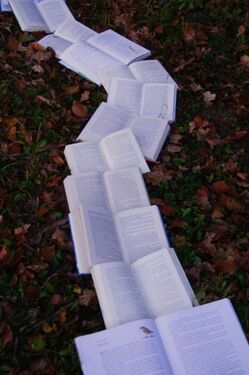|
by Allison Padron For some, the words "literary fiction" brings up images of tweed jackets, learned academics, dinner conversations over wine, and personal libraries filled with only the finest of literature. The "literary" label is usually applied by critics to novels considered so intellectual, so linguistically beautiful, and so meaningful that they apparently need to be separated out from the mass-market, "mindless" genre novels. The debate about the distinctions between genre fiction and literary fiction still rages (as it likely will for many more years), with some classifying literary fiction as an entirely different genre, others as a continuum with genre fiction, and still others saying the "literary" quality is something that a novel of any genre can possess. From everything I’ve read on the subject, though, no one seems to have come up with a clear definition of literary fiction (other than "not genre fiction"), which begs the question: why call anything literary fiction at all?
0 Comments
by Gianna Forgen  Photo by Annie Spratt on Unsplash Photo by Annie Spratt on Unsplash When I was in elementary school, I read all the time. I vividly remember, during a snack break, I had become so entranced by my book that I had missed my teacher calling my table for our turn to use the bathroom. I remember, too, the look on her face, probably wondering if it was worse that I hadn’t listened, or worse to chastise me for reading. Back then, it felt like everyone loved to read. When we filled out posters at the beginning of the school year detailing our hobbies, two took precedence above all others: reading and writing. As students, we had to read, of course, but it seemed like everyone still enjoyed it, at least the kids in my class. In elementary school, a boy I was friends with and I read the entire Harry Potter series at the same time–he finished Deathly Hallows only fifteen minutes before me. He was one of the most voracious readers I knew. by Qwayonna Josephs
Looking back now, it’s crazy to think that my introduction to Black-led stories was a book with a Black man on the cover, holding a gun, a book that was distributed to schools from Scholastic and praised as honest portrayals of inner city kids. Yet, every one of those books I read came from the mind of Paul Langan, a white man who claims in an interview that his intention behind the idea was sparked by minority students wanting to see themselves in print. I’m sure that drew lots of students to the books, seeing someone who looked like them on the cover―it definitely drew me in―but, with maturity and clarity, I now understand the harmfulness of these stories and characters. While trying to show our “experiences,” the books highlight negative stereotypes, slap on a problematic cover, and end up in the hands of impressionable elementary, middle, and high school kids that are desperate to see themselves in a story.
Amanda Smera Welsh
If you are a writer, especially a writer in the middle of a graduate program, you will undoubtedly encounter many craft materials through the course reinforcing the need to establish a discipline to your own writing. Sometimes, they can sound a little delusional, which was precisely my reaction when I read Robert Olen Butler’s “From Where You Dream.” It truly is the most overtold advice any writer has heard before: “You may not be ready to write yet, but when you’re in a project you must write every day. You cannot write just on weekends. You cannot write this week and not next week; you can’t wait for the summer to write. You can’t skip the summer and wait till the fall. You have to write every day. You cannot do it any other way. Have I said this strongly enough?” Yes you have, dude, now please shut up! by Cat Reed
Those were the roots that the newly created stories ventured forth from, but it would seem that instead of embracing that part of the history, authors would rather avoid the fanfiction they used to write as one would avoid a dog in desperate need of a bath.
|
Archives
April 2024
Categories
All
|
|
Glassworks is a publication of Rowan University's Master of Arts in Writing 260 Victoria Street • Glassboro, New Jersey 08028 glassworksmagazine@rowan.edu |
All Content on this Site (c) 2024 Glassworks
|



 RSS Feed
RSS Feed
